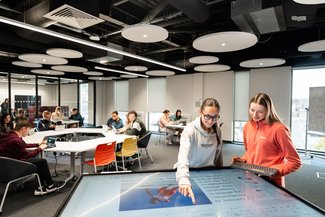Over the past decade, Southern Regional College (SRC) has been transforming. We are one of six regional colleges in Northern Ireland and provide around 10,000 enrolments each year with qualifications and work-ready skills employers are crying out for. Skills like communication, teamwork, resilience, and problem-solving. Ten years ago, SRC’s senior management team decided that embedding Project Based Learning (PBL) was the way to achieve this. We’ve since worked hard to integrate this practice across our level 2 and 3 curriculum. And it has been worthwhile. As PBL gained in popularity we’ve delivered new Level 2 NI Traineeships and further and higher education courses, for which PBL is proving one of the best ways to enhance student engagement and employability.
While many colleges include PBL as an option, we embed it within all our courses because we have found it far more effective than traditional didactic teaching methods. Still, despite early success, complacency began to set in. That’s why, about five years ago, my role of ‘PBL Manager’ was created to refocus efforts, support staff, and ensure our projects met gold standard PBL criteria.
A key aspect of my role involves helping people understand that PBL is about changing how we teach and learn. Students lead; we scaffold. We put them in situations that force them to think, problem-solve, and develop independence. Achieving this means winning over teaching staff, allocating time for training, upskilling teams, and freeing lecturers’ time to focus on implementation. Not easy for a small team and a large, diverse College! Early on, I also realised SRC had been looking internally for best practice. This felt short-sighted, so I engaged with the Edge Foundation as a critical friend. Over the years, that relationship has grown and led to incredible opportunities – I’ve seen PBL in action across the UK and have even been to Denmark to see PBL in Danish schools. We're now members of the Deeper Learning UK network, allowing us to help others on their journeys, while continually challenging ourselves.

Assessment is another hurdle. Some people think PBL is constrained by awarding organisation specifications and assessment criteria. However, with proper planning and mapping to curriculum, PBL is inherently flexible. It’s getting staff to adopt the mindset that PBL is just a different way of delivering and evidencing learning. Yet within that are essential criteria which must be met: the driving question, student choice and voice, critique, expert feedback, launch and showcase activities, etc. and we bring it back to these when planning, implementing and reviewing projects. We try to keep at the fore the reason we implement PBL. How have students developed the skills employers want? Have they overcome challenges? Can they talk about the learning and skills they have developed through their project?

That’s where our annual sector-wide PBL competition comes in, when students present their projects and compete against other colleges. This year, we’re hosting the event as part of our decennial celebration. Seeing students confidently present their projects to a panel of business experts may not be quantifiable, but it’s invaluable. As we celebrate the tenth anniversary of implementing PBL, we’ve collaborated with Edge to codify our journey and lessons learned. This isn’t a prescriptive guide, but rather a way to pass on valuable insights – hopefully, readers will find at least one useful idea in there! We also provide practical resources for our staff and are enticing busy staff with engaging attention-grabing images, videos or short reads through Microsoft Teams. For those with a deeper interest, we offer more in-depth insights on topics like the driving question or launch events. Our goal is to upskill and educate staff without requiring mandatory training sessions.

PBL isn’t always the easy route. It’s an off-road journey - hard at times but the experience and skills make it worthwhile. Students don’t just learn facts; they learn how to learn, collaborate, and overcome challenges. We’ll continue pushing boundaries, ensuring our learners are not just qualified but truly ready for the world beyond.
Written by Lynne Ervine
Lynne is the Project Based Learning and Technology Enhanced Learning Manager at Southern Regional College in Northern Ireland
